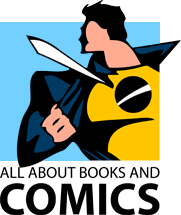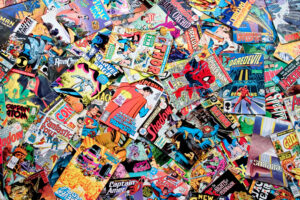As promised, here’s the second part of our Top Ten of the ’00s list: the five best regularly-published comic book series (and, to those of you arguing that the decade doesn’t end until next year: this is why no one likes any of you people…):
Ultimate Spiderman, by Brian Michael Bendis and Mark Bagley (plus a little Stuart Immonen and David LaFuente, right near the end) (2000 – present)
Debate Bendis’s effects on the Marvel Universe all you want, but this was a game-changing series: it brought “decompression” into the superhero comics storytelling vocabulary, changed the way characters spoke, helped to eliminate thought balloons, and showed that Peter Parker in high school, learning to use his powers, was a powerful and iconic setting for contemporary stories (and, if you think that was obvious back in 2000, you don’t remember the ill-fated and critically-panned Spider-Man: Chapter One). Trade volumes 2 (against the Kingpin) and 3 (against Dr. Octopus) are the best starting places; their depiction of a young, noble but naive hero struggling to make a difference are pitch-perfect, and Bagley’s ability to draw both superhero fights and human expression (an entire issue set in Peter’s bedroom? Where all he does is talk to Mary Jane? Hey, it’s the best one…) show why he and Bendis deserved to break the Lee-Kirby record for most issues on a Marvel title by the same creative team. Yes, the title gets encrusted in continuity as it goes along, but the sheer volume of good stories here make it hard to deny it a place on this list.
New X-Men, by Grant Morrison and Frank Quitely (and Ethan van Sciver, Leinil Francis Yu, Igor Kordey and Tom Derenick) (2001-2004)
Another game-changer, which injected new life into Marvel’s other best-selling title that had fallen on hard creative times. As with Ultimate Spider-Man, it’s hard to remember now what a breath of fresh air this was (Costumes? Please…), and how casually Morrison was able to sprinkle his high-concept ideas (Cassandra Nova, Xorn) and his carefully-laid, mind-blowing plot twists (Cassandra Nova, Xorn) into a massive story with dozens of moving parts that, somehow, all worked seamlessly as glitzy, thoughtful entertainment. Quitely’s pencils were a revelation (his covers alone made the book), but even with a succession of other artists the fun kept rolling on. The standard critical take on New X-Men is that the second half didn’t live up to the first half — but what could? When someone comes into the store and says “What’s a great X-Men series to read?”, this is the recommendation, without hesitation.
Fables, by Bill Willingham and Mark Buckingham (plus Steve Leialoha, Lan Medina, Bryan Talbot,Mike Allred and others) (2002 – present)
Vertigo was the imprint of the ’90s (Preacher, Transmetropolitan, Invisibles) and did pretty well in the ’00s, too — both 100 Bullets and Y, The Last Man were contenders for this list. However, Fables is the one with the staying power: it’s about to pass 100 issues, and is still going strong, better than ever (most writers would have ended the series with the finale of the Adversary War a few years ago, but Willingham simply used that ending as a springboard to even better stories, on an even wider canvas). The imaginative setting, the clever way Willingham’s able to combine human drama with fantasy-game style tactics and strategy, the gorgeous run of James Jean covers, and the storybooklike interior art all combine to make this a magical series, one that’s a great comics envoy to the larger world.
Punisher, by Garth Ennis and Steve Dillon and Goran Parlov (and Darick Robertson, Tom Mandrake, Cam Kennedy, John McRea, Doug Braithwaite, Leandro Fernandez and others) (2000 – 2008)
Why this title, instead of others? Rock-solid stories, covering a wider range of tone than someone contemplating Marvel’s grim anti-hero would have thought possible, from the over-the-top, ultra-violent fun of the early, Dillon-penciled issues to the graveyard humor of a character like Barracuda, to the later Max issues and their weary, existential despair (although that’s lightened by the way Frank never gives up; he’s a hero just by virtue of getting himself out of bed every day to continue his fight). Unlike many series, too, the craftsmanship just kept getting better and better; the 10th and last trade in Ennis’s Max run, Valley Forge, Valley Forge, is as good as any of the rest, as stripped-down and serviceable as a familiar old rifle, and with the same comforting kick.
All-Star Superman, by Grant Morrison and Frank Quitely (2006 – 2007)
Yes, this is technically a mini-series, and I debated about using another, more regularly-published title instead (Goon and Usagi Yojimbo were on the list, along with shorter-lived series like Ultimates and The Authority, and even Beasts of Burden), but all got rejected for various reasons. Besides, All-Star Superman is so casually amazing, in the way it delivers all the iconic chapters in Superman’s life (here’s your Lois Lane story; here’s your Jimmy Olsen; here’s Bizarro; here’s Kryptonians; here’s Lex Luthor, vs. both Clark Kent and Superman; here’s… well, every chapter imaginable in the Myth of the Superhero, precisely and wonderfully presented without a wasted line or a wrong note), that it sweeps all before it and demands to be here. ASS doesn’t have the sheer volume of good work of some of the other books on this list, but the 12-comic run condenses most of what’s thrilling and imaginative about superhero comics into one perfect, sustained whole: All-Star, no question.
Phil Mateer



